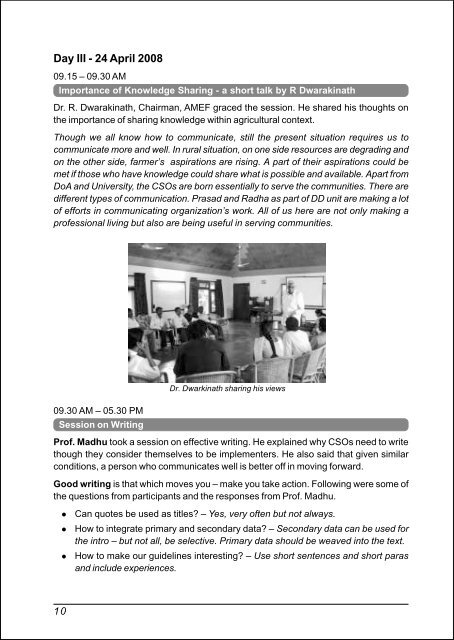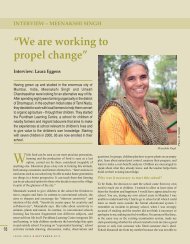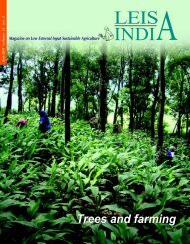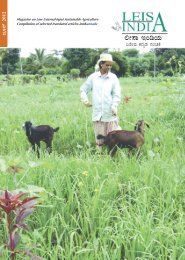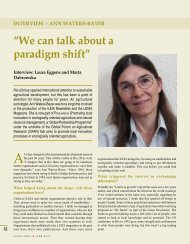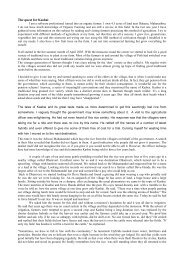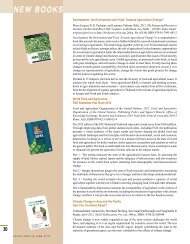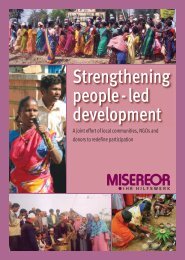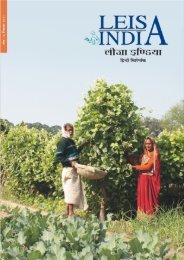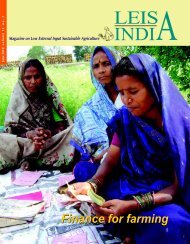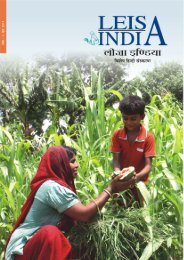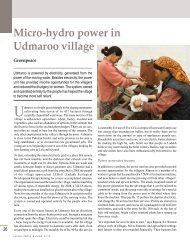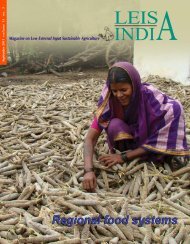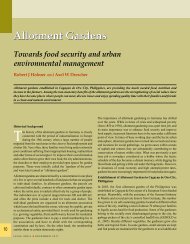Workshop on Knowledge Management in Civil Society ... - Leisa India
Workshop on Knowledge Management in Civil Society ... - Leisa India
Workshop on Knowledge Management in Civil Society ... - Leisa India
You also want an ePaper? Increase the reach of your titles
YUMPU automatically turns print PDFs into web optimized ePapers that Google loves.
Day III - 24 April 200809.15 – 09.30 AMImportance of <strong>Knowledge</strong> Shar<strong>in</strong>g - a short talk by R Dwarak<strong>in</strong>athDr. R. Dwarak<strong>in</strong>ath, Chairman, AMEF graced the sessi<strong>on</strong>. He shared his thoughts <strong>on</strong>the importance of shar<strong>in</strong>g knowledge with<strong>in</strong> agricultural c<strong>on</strong>text.Though we all know how to communicate, still the present situati<strong>on</strong> requires us tocommunicate more and well. In rural situati<strong>on</strong>, <strong>on</strong> <strong>on</strong>e side resources are degrad<strong>in</strong>g and<strong>on</strong> the other side, farmer’s aspirati<strong>on</strong>s are ris<strong>in</strong>g. A part of their aspirati<strong>on</strong>s could bemet if those who have knowledge could share what is possible and available. Apart fromDoA and University, the CSOs are born essentially to serve the communities. There aredifferent types of communicati<strong>on</strong>. Prasad and Radha as part of DD unit are mak<strong>in</strong>g a lotof efforts <strong>in</strong> communicat<strong>in</strong>g organizati<strong>on</strong>’s work. All of us here are not <strong>on</strong>ly mak<strong>in</strong>g aprofessi<strong>on</strong>al liv<strong>in</strong>g but also are be<strong>in</strong>g useful <strong>in</strong> serv<strong>in</strong>g communities.Dr. Dwark<strong>in</strong>ath shar<strong>in</strong>g his views09.30 AM – 05.30 PMSessi<strong>on</strong> <strong>on</strong> Writ<strong>in</strong>gProf. Madhu took a sessi<strong>on</strong> <strong>on</strong> effective writ<strong>in</strong>g. He expla<strong>in</strong>ed why CSOs need to writethough they c<strong>on</strong>sider themselves to be implementers. He also said that given similarc<strong>on</strong>diti<strong>on</strong>s, a pers<strong>on</strong> who communicates well is better off <strong>in</strong> mov<strong>in</strong>g forward.Good writ<strong>in</strong>g is that which moves you – make you take acti<strong>on</strong>. Follow<strong>in</strong>g were some ofthe questi<strong>on</strong>s from participants and the resp<strong>on</strong>ses from Prof. Madhu.Can quotes be used as titles? – Yes, very often but not always.How to <strong>in</strong>tegrate primary and sec<strong>on</strong>dary data? – Sec<strong>on</strong>dary data can be used forthe <strong>in</strong>tro – but not all, be selective. Primary data should be weaved <strong>in</strong>to the text.How to make our guidel<strong>in</strong>es <strong>in</strong>terest<strong>in</strong>g? – Use short sentences and short parasand <strong>in</strong>clude experiences.10


